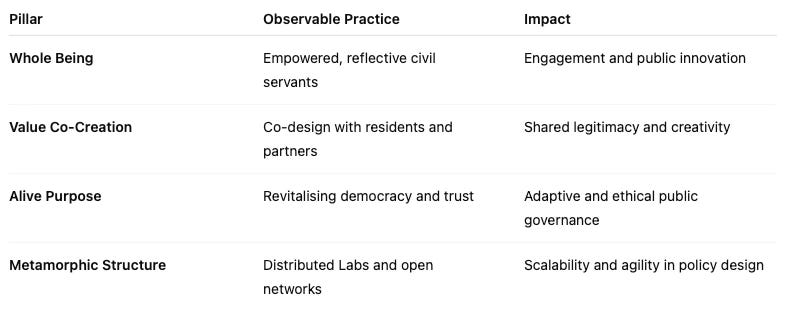The Netherlands’ Municipality Labs - Case Study
Public Institutions as Living Systems for Collective Intelligence and Participatory Governance
Context and Overview
The Municipality Labs (GemeenteLabs) in the Netherlands are a network of local government innovation ecosystemsthat emerged over the last decade as part of a broader movement toward open governance, civic participation, and systemic learning.
These Labs are not singular entities, but living laboratories embedded in municipalities such as Amsterdam, Rotterdam, Utrecht, Eindhoven, and Delft.
They operate as adaptive environments for experimenting with new ways of governing — combining human-centred design, co-creation, and digital transformation to improve public services and community wellbeing.
The initiative’s core philosophy:
“Public institutions should learn and evolve as living systems, not act as static bureaucracies.”
Municipality Labs demonstrate how Alive Organisation principles — autonomy, purpose, co-creation, and adaptive structure — can reanimate public institutions.
1. Whole Being – Public Servants as Changemakers
In traditional administration, public employees often work within rigid hierarchies.
Municipality Labs invert this model by treating civil servants as social innovators and system designers.
Key Whole Being practices:
Empowered Autonomy: Local teams are trusted to experiment with new service models and policy prototypes.
Human-Centred Design: Employees co-create solutions directly with residents, using empathy-based research and field immersion.
Learning Culture: “Failure” is reframed as learning; teams share lessons openly across municipalities.
Psychological Safety: Cross-functional lab environments encourage speaking up, challenging norms, and taking initiative.
This creates a public-sector culture of learning, curiosity, and ownership, reflecting Whole Being Practices in civic institutions.
2. Value Co-Creation – Governance With Citizens
Municipality Labs replace “government for citizens” with government with citizens.
They are co-creative ecosystems connecting civil servants, residents, entrepreneurs, NGOs, and researchers in the design and delivery of public value.
Examples of co-creation initiatives:
Rotterdam’s Open Government Lab: Residents co-design local policies and digital transparency tools.
Amsterdam’s Chief Technology Office (CTO Lab): Public–private collaborations on urban tech and sustainability projects.
Utrecht’s Participation Lab: Testing new democratic models such as citizens’ assemblies and neighbourhood-driven budgeting.
Eindhoven’s Data Commons Projects: Residents involved in ethical governance of smart-city data.
This ecosystem transforms governance into a living process of shared authorship, where value emerges from relationships rather than regulations.
3. Alive Purpose – Democracy as a Living Practice
The overarching Superior Purpose of the Municipality Labs is to revitalise democracy — making it more adaptive, relational, and life-serving.
Purpose in practice:
Reconnecting Citizens and Institutions: Bridging trust gaps through transparency and co-design.
Sustainability and Inclusion: Ensuring that technological innovation serves social equity and environmental health.
Foresight and Anticipation: Municipal teams explore future scenarios around urbanisation, AI, and climate adaptation.
Ethical Grounding: Each initiative is guided by the question, “Does this enhance the agency and wellbeing of our citizens?”
Alive Purpose here is systemic stewardship — positioning government not as a controller, but as an enabler of collective thriving.
4. Metamorphic Structure – Adaptive Governance Networks
Municipality Labs are designed as networked organisms, not bureaucratic hierarchies.
Their structural innovation lies in how they balance local autonomy with national coordination.
Structural characteristics:
Distributed Local Labs: Each municipality operates its own Lab, tailored to local context and community needs.
Cross-Lab Collaboration: Shared learning networks (such as the NL Design System and Common Ground Initiative) connect Labs across cities.
Hybrid Teams: Public employees, designers, and residents collaborate on equal footing.
Digital Infrastructure: Shared open-data platforms and APIs enable interoperability and transparency.
The Labs embody Metamorphic Structures — adaptable, transparent, and capable of evolving policies through iterative cycles.
Governance and Decision Flow
Governance within Municipality Labs is participatory and reflexive rather than procedural and static.
Open Decision-Making: Decisions are documented and published through online participatory tools.
Rotating Roles: Team members take turns facilitating projects, distributing authority.
Embedded Accountability: Citizens and local councils review project impact through transparent dashboards.
Iterative Policy Cycles: Prototypes and pilots inform policy updates dynamically.
This governance design replaces compliance-based management with learning-based governance — a core quality of living systems.
Systemic Integration
Municipality Labs show coherent integration across all four pillars:
This integration enables the public sector to behave like a learning ecosystem — sensing, adapting, and evolving in real time.
Lessons for Other Organisations
Trust frontline innovators – Empower local teams closest to citizens.
Redefine public value as co-created – Involve people in shaping the systems that affect them.
Make governance transparent by default – Use digital tools to open decision-making processes.
Build structures that learn – Treat policy as an evolving prototype.
Reconnect purpose and democracy – Purpose-driven government restores citizen trust.
Municipality Labs show that bureaucracies can evolve into living, learning systems when guided by trust and purpose.
Conclusion
The Netherlands’ Municipality Labs exemplify how Alive Organisation principles can transform governance from control to collaboration. They reveal that public institutions can embody aliveness — sensing, responding, and regenerating alongside the communities they serve.
By merging design thinking, civic participation, and ethical foresight, these Labs represent the future of adaptive, democratic governance — governments as living systems that grow with their people.
“We are not experimenting with technology; we are experimenting with democracy.”
— Municipality Lab Facilitator, Amsterdam
Enjoy reading and applying these materials. If you’d like to receive additional information regarding Alive Organisations topic please subscribe below.


